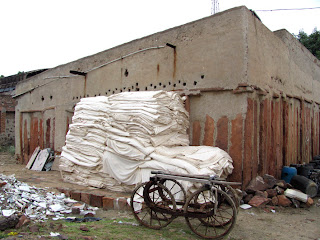Problems with Blogger on the move often meant
no pictures or too many. So here is the process
of silk screen printing from white cloth to the
finished product
Stacks of screens, with permanently printed patterns
The print table - yes, it was dark with
visible fumes. No health and safety here.
Printed cloth
At the end of the line
washed cloth ready for drying
Drying on frames, around 10ft tall with
racks to accommodate the print run
All dried and ironed ready for dispatch
Piles of small silk screens for use in
packaging - bearing the manufactures
details and others with clients address.
After a little research, it appears that silk
screen printing is over taking the traditional
block printing. It is easier, quicker and
pays well. Consequently small block
printing units are closing down.
The silk screen process churns out metres
of cloth in minutes. Unfortunately many
chemicals are involved. Combined with the
concentration of printing activities this has
triggered a high level of pollution.
I think, however, there are still small
communities who carry on making the
traditional prints. It is a far more labour
intensive operation. Maybe this takes
place in villages on the outskirts of
the town. Their textiles, in rich blues,
reds and yellows, are still much in
demand apparently, though probably
produced to order. I shall have to
continue my search next visit.










2 comments:
Hi Tiggy,
Thank you for the recent, interesting posts about India! And wishing you the best for getting used to the British weather and life again,
Regina
Thanks Regina. Lots more to post over the next week.
Post a Comment